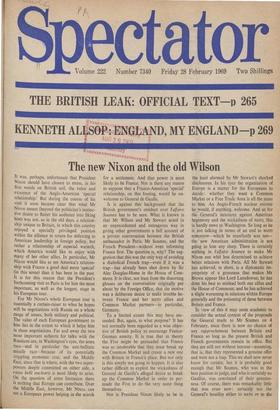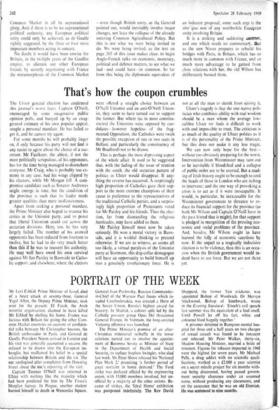3X.,%)0X)XXEXls4Xft94.4XaMA AAIXt)OaXtrf):0 1 2 4 t
The new Nixon and the old Wilson
It was, perhaps, unfortunate that President Nixon should have chosen to stress, in his first words on British soil, the value and existence of the Anglo-American 'special relationship.' But during the course of his visit it soon became clear that what Mr Nixon meant (beyond the politician's instinc- tive desire to flatter his audience into liking him) was not, as in the old days, a relation- ship unique to Britain, in which this country enjoyed a specially privileged position within the alliance in return for deferring to American leadership in foreign policy, but rather a relationship of especial warmth, which America would like to enjoy with many of her other allies. In particular, Mr Nixon would like to see America's relation- ship with France a good deal more 'special' (in this sense) than it has been in the past. It is for this reason that the President's forthcoming visit to Paris is for him the most important, as well as the longest, stage in his European tour.
For Mr Nixon's whole European tour is essentially a curtain-raiser to what he hopes will be negotiations with Russia on a whole range of issues, both military and political. The value of each European government to him lies in the extent to which it helps him in these negotiations. Far and away the two most important subjects for talks with the Russians are, in Washington's eyes, the arms race—and in particular the anti-ballistic missile race—because of its potentially crippling economic cost, and the Middle East, since that is where, with the two super- powers deeply committed on either side, a cams belli nuclearis is most likely, to arise. On the question of arms limitation there is nothing that Europe can contribute. Over the Middle East, however, Mr Nixoti can see a European power helping in the search for a settlement. And that power is most likely to be France. Nor is there any reason to suppose that a Franco-American 'special' relationship, on this footing, would be un- welcome to General de Gaulle.
It is against this background that the British government's conduct over Wake Soames has to be seen. What is known is that Mr Wilson and Mr Stewart acted in an unprecedented and outrageous way in giving other governments a full account of a private conversation between the British ambassador in Paris, Mr Soames, and the French President—without even informing France first. The question is, why? The sug- gestion that this was the only way of avoiding a diabolical French trap—even if it was a trap—has already been shot down by Sir Alec Douglas-Home in the House of Com- mons. It is clear, not least from the distorting glosses on the conversation originally put about by the Foreign Office, that the motive was a deliberate desire to make trouble be- tween France and her NATO allies and Common Market partners—in particular, Germany.
To a limited extent this may have suc- ceeded. But, again, to what purpose? It has not normally been regarded as a wise objec- tive of British policy to encourage Franco- German enmity. It is true that in theory the Five might be persuaded that France was so intolerable that they must break up the Common Market and create a now one with Britain in France's place. But not only is this simply not going to happen. It is also rather difficult to exploit the wickedness of General de Gaulle's alleged desire to break up the Common Market in order to per- suade the Five to do the very same thing themselves.
Nor is President Nixon likely to be in the least alarmed by Mr Stewart's shocked disclosures. In his eyes the organisation of Europe is a matter for the Europeans to decide : whether they want a Common Market or a Free Trade Area is all the same to him. An Anglo-French nuclear entente he would, if anything, welcome. And as for the General's strictures against American hegemony and the wickedness of NATO, this is hardly news to Washington. So long as he is not talking in terms of an end to NATO tomorrow—which he manifestly was not— the new American administration is not going to lose any sleep. There is certainly nothing in l'aflaire Soames to make Mr Nixon one whit less determined to achieve better relations with Paris. All Mr Stewart has achieved, in short, is a diplomatic im- propriety of a grossness that makes Mr Brown appear like Lord Lansdowne; he has done his best to mislead both our allies and the House of Commons; and he has achieved a slight worsening in relations within Europe generally and the poisoning of those between Britain and France.
In view of this it may seem academic to consider the actual content of the proposals the General made to Mr Soames on 4 February, since there is now no chance of any rapprochement between Britain and France so long as the present British and French governments remain in office. But they are still not without interest—assuming, that is, that they represented a genuine offer and were not a trap. This we shall now never know for certain; but it is probably good enough that Mr Soames, who was in the best position to judge, and who is certainly no Gaullist, was convinced of their genuine- ness. Of course, there was remarkably little that was even new : certainly not the General's hostility either to NATO or to the Common Market in all its supranational glory. And if there is to be no supranational political authority, any European political unity could only be achieved, as de Gaulle rightly suggested, by the three or four most important members acting in concert.
No doubt it would have been unwise for Britain, in the twilight years of the Gaullist empire, to alienate our other European friends by secretly negotiating with France the metamorphosis of the Common Market —even though British entry, as the General pointed out, would inevitably involve major changes, not least the collapse of the already tottering Common Agricultural Policy. But this is not what we were being invited to do. We were being invited, as the text on page 265 of this issue makes clear, to begin Anglo-French talks on economic, monetary, political and defence matters, to see what we had—and could have—in common. So far from this being the diplomatic equivalent of an indecent proposal, some such step is the sine quanon of any worthwhile European unity involving Britain.
It is a striking and saddening contrast, and one which needs no commentary. that as the new Nixon prepares to rebuild his bridges with Paris, in Britain, which has so much more in common with France, and so much more advantage to be gained from close relations with her, the old Wilson has deliberately burned them.



































